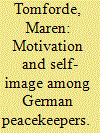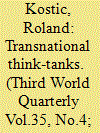| Srl | Item |
| 1 |
ID:
069901


|
|
|
|
|
| Publication |
2005.
|
| Summary/Abstract |
Based on anthropological fieldwork and questionnaire surveys, this article examines the experience of German peacekeeping units (7th and 8th contingents) deployed to Bosnia and Herzegovina (BiH) as part of the Stabilization Force (SFOR) in 2003-04. The main research topic was the motivation of German soldiers of all ranks before embarking on and during peacekeeping missions. The results of this quantitative and qualitative study emphasize that differences exist between motivation for deployment and motivation during deployment. These differences are explained and linked with results from the assessment of Bundeswehr soldiers' self-images during deployment.
|
|
|
|
|
|
|
|
|
|
|
|
|
|
|
|
| 2 |
ID:
133259


|
|
|
|
|
| Publication |
2014.
|
| Summary/Abstract |
Peace-building situations can be described as battlefields of ideas where key international policy makers engage in internal battles for control over intervention policy. Knowledge production, based on timely information and analysis, is seen as crucial to winning these battles of ideas. By providing detailed information, analysis and recommendations, the International Crisis Group (icg) has assumed an important role in this process. Yet we know little about the specific role the icg plays in battles for intervention policy. This article investigates icg analyses and recommendations and the way they fit into the specific internal debates within the international community in Bosnia and Herzegovina (BiH) in 2000-01. By looking at the work of the icg in BiH around the elections in 2000, the article demonstrates that it often acted as a legitimising agent of US positions and policy in the country.
|
|
|
|
|
|
|
|
|
|
|
|
|
|
|
|
| 3 |
ID:
145022


|
|
|
|
|
| Summary/Abstract |
It is commonly accepted that peace operations produce public goods. Informed by theories of collective action, the article tests the claim that middle powers were free-riders in NATO’s peace operations in the Balkans (IFOR, SFOR, KFOR) from 1995–2001. In so doing, we charge that calculating the level of defence spending as a share of a country’s GDP, which has become the standard index in the literature, is limiting. We suggest that the active military-duty force share index is a better index to use, and find that middle powers did not free-ride in NATO’s peace operations in the 1990s. Quite to the contrary: they contributed more to NATO’s public good of peacekeeping than countries like France or Germany, and more than expected based on their economic abilities measured in GDP. The article then asks what could be inferred from this analysis, and offers theoretical and methodological points of critique before suggesting new avenues for future research in this vibrant research programme.
|
|
|
|
|
|
|
|
|
|
|
|
|
|
|
|